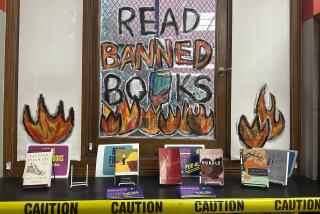A mere muggle must decide
- Share via
NEW YORK -- Now that the petty wrangling, emotional outbursts and mind-numbing duels over Latin words roots have ended, the federal judge in this week’s Harry Potter trial faces a daunting task: How do you balance an author’s right to protect her copyrighted novels with a publisher’s right to produce a new book that borrows heavily from these bestselling texts?
Based on his comments during the trial, U.S. Judge Robert S. Patterson Jr. would rather not be deciding the case at all, which pits J.K. Rowling, author of the seven Harry Potter novels, against RDR Books, a Michigan firm hoping to publish “The Harry Potter Lexicon,” an unauthorized encyclopedia. Indeed, the judge seemed at times to long for a wand -- perhaps to conjure one of Hogwarts’ magical spells like “Silencio,” causing people to fall silent.
“Litigation isn’t always the best way to solve things,” Patterson told Rowling, who sat quietly at a desk facing the bench, and attorneys for both sides. “Can it be resolved another way? I feel that this case could be settled and should be settled.”
In fact, cases like this are often settled by a licensing agreement, in which the publisher pays an agreed-upon fee to the creator of a book, according to intellectual property attorneys. But neither side has shown any sign of backing down in the Harry Potter clash, which blends elements of digital, new-age technology with old-school publishing, and highlights the fierce competition to profit from Rowling’s spectacularly successful literary and movie franchise.
Attorneys will file final papers May 9 and the judge, who is deciding the case without a jury, speculated it could spend years in appellate court and the Supreme Court after that.
During the frequently acrimonious proceedings, lead witnesses on both sides either fought back tears or sobbed on the stand. Spectators got a crash course in Harry Potter arcana, and a handful of courtroom autograph seekers tried to get Rowling to sign copies of her novels.
The author opened the door to compromise Wednesday, saying she might accept a version of the “Lexicon” that used less of her language. But she also stuck to her guns in a post-trial statement: “Authors have a right to protect their works from misuse. If this book is published it will open the floodgates for anyone to lift an author’s work and present it as their own.”
In his closing remarks, Anthony T. Falzone, with the Stanford Law School Center for Internet and Society, said RDR Books is protected by “fair use” law -- which permits titles based on copyrighted material to be published as long as they add to the text in a “transformative” way. The book that Rowling wants to quash, Falzone argued, “just isn’t a book that should disappear.” A decision to kill it, defenders said, could have a chilling effect.
A fan’s passion
At the heart of the conflict is Steven Vander Ark, a mousy-looking middle-school librarian from Michigan who created the Lexicon, a popular website devoted to Pottermania. The site offers fans information about the books and Rowling herself, but its main contribution has been to categorize thousands of details from Rowling’s seven novels -- plot lines, character histories, etymological information and the like -- in accessible, alphabetical listings.
The trouble began last fall, when RDR Books approached Vander Ark and asked if he would like to produce a hard-copy distillation of the Lexicon that could be sold in bookstores. Under the marketing plan, the book would have appeared last November, selling for $24.95. The publisher envisioned a modest first printing of 10,000 copies.
Rowling’s attorneys got wind of the plan and immediately sought to halt publication. The author, joined by attorneys for Warner Bros. Entertainment, which made the Harry Potter movies, charged that most of the entries in the new book pilfered the original language and the ideas in her novels. Rowling also noted that she has long planned to write her own guide to the Harry Potter novels and said “The Harry Potter Lexicon” would preempt her rights to her own material. In emotional testimony, she said the case has caused her great distress.
RDR books, which halted publication pending the trial, defended itself as a small publisher being intimidated by high-powered lawyers. It said the proposed book was merely a helpful reader’s reference guide -- similar to those that have been published for other bestselling fantasy book series, including J.R.R. Tolkien’s “The Lord of the Rings” and C.S. Lewis’ “The Chronicles of Narnia.”
The case has revealed contradictions on both sides: Rowling, who condemned “The Harry Potter Lexicon” book, gave the original website a “fan site award” in 2004. Vander Ark, who defended his right to produce the book, initially voiced fears to the publisher that the book might violate Rowling’s copyright protections. He wrote the text only after RDR indemnified him against claims for damages.
A key issue is whether “The Harry Potter Lexicon” makes a new and important contribution to Rowling’s canon or whether it is a thinly disguised theft of her rich imaginative world. Both sides produced academic experts, whose clashing and often arcane explorations of Latin word roots frequently proved confusing.
Bringing in experts
In one exchange, Janet Sorensen, an associate professor of English literature at UC Berkeley, argued that the book offers rich insights into Rowling’s multilayered prose. An example, she said, is its discussion of “Colloportus,” a Hogwarts spell causing doors to seal shut. The roots derive from the Latin “colligo, to bind together,” and “portus, door.”
But Jeri Johnson, a lecturer in English at Exeter College, University of Oxford, criticized that reference, noting “the term ‘portus’ normally is translated as ‘harbor,’ rarely as ‘entrance.’ ‘Porta,’ now that might well give you ‘door,’ ” she concluded.
More important, Johnson said she has analyzed “The Lexicon” and concluded that “out of the 2,437 entries, 2,034 entries simply lift information straight out of the Harry Potter books.” If he borrowed or used similar language, Vander Ark responded in his testimony, it was only because he was writing a reference guide to a world drawn from Rowling’s imagination. It was inevitable, he said, that a portion of his entries would mirror her language.
After three days of incessant wrangling, Patterson repeated his own unofficial verdict in advance of the ruling he’ll be issuing weeks from now: “This case, with imagination, could be settled.”
--
More to Read
Sign up for our Book Club newsletter
Get the latest news, events and more from the Los Angeles Times Book Club, and help us get L.A. reading and talking.
You may occasionally receive promotional content from the Los Angeles Times.









